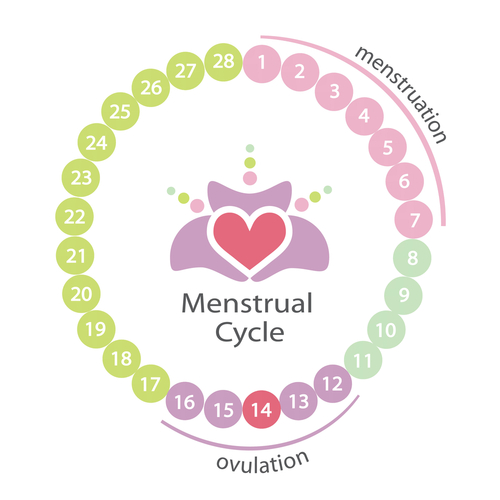Kapha dominates through the first stage of life as it is the dosha which builds and nourishes. Pitta dominates as we enter puberty, throughout our adulthood and until after the menopause. Vata dominates into the later stages of life, post menopause.
From an Ayurvedic perspective, when we look at the female menstrual cycle, this also has stages which are more Vata, Pitta and Kapha.
The Vata phase from approx day 1-5 from the first day of bleeding.
The Kapha phase from the end of bleeding until ovulation (days 4-14)
The Pitta phase lasts from ovulation until your period starts (day 14-18)
Vata women tend to have more irregular periods with scanty blood flow, which last a few days. Pitta women tend to have a regular 28 day cycle with dark, plentiful blood flow and Kapha women tend to have a longer cycle with little blood loss.
Vata is the force that regulates all downward movement, pushing the munstruum down and out of the body. Vata predominates during this part of your cycle. Vata dominant women may feel a little more imbalanced here. Feeling forgetful or clumsy and generally a little out of sync. Some general advise would be to keep warm, eat warming foods, make some calm space in your life and avoid too much exercise.
Calming and nourishing herbs and teas: liquorice, caraway, ajwain, cumin, cardamon, ginger, cinnamon are all good for vata. Avoid anxiety inducing stimulants: tea, coffee, alcohol, pungent herbs and spices.
The Kapha phase: Kapha is the building and nourishing dosha. During this phase, the endometrium builds, oestrogen is high, restoring, strengthening and preparing the body for conception.
If you are a more Kapha type, you may experience Kapha imbalance here: fluid retention, weight gain, lumpy breast, vaginal discharge, tiredness, fatigue, general heaviness in the body. Kapha types not only store energy, but also emotions, so you feel a little low and teary now.
How to correct this: energise and warm the body, get outside, stay active.
Herbs to support Kapha will counteract Kapha’s cold heavy qualities. Pungent herbs will strengthen agni (digestive fire) carminative herbs with promote digestion. Warming and invigorating spices: ginger, turmeric, garlic, cloves, cinnamon, ajwain, bay leaf and nutmeg are all good digestive aids for kapha.
Pitta phase: Characteristics of Pitta can be hot and fiery. Pitta is also transformative, where the body prepares itself for new life. This is also reflected in this phase of your cycle: Pitta prepares the body in readiness for conception. Progesterone peaks at this stage. PMS is a sign of pitta imbalance, due to the hot Pitta accumulating in the blood and the liver. Extra heat in the body: skin irritation, headache, diarrhoea, emotional, irritation, anger. Pitta types can really feel the fire at this stage.
Support Pitta by introducing cooling, detoxifying herbs: coriander, cumin, fennel, dill chamomile, an abundance of cooling green, anti-oxidant, anti-inflammatory vegetables.
As the womb is situated in the apana vata area, most menstrual problems are due to disturbed vata, although there is involvement of the other doshas.
Vata symptoms:
Irregular/scanty and cessation of periods.
Pain and pressure
Pitta Symptoms:
Burning sensation
Excessive sweating and heat in the body
Bad odour
Yellow/slimy vaginal discharge
Kapha Symptoms:
Muscus in mentrual blood
Phlegm like vaginal recreations.
Itchiness
Lots of white odourless discharge
Maintaining a healthy menstrual cycle
A major cause of menstrual problems is consuming incompatible foods, so your diet should reflect your dosha to maintain overall health. Vata women who habitually consume dry: nuts, seeds, dry grains such as oats, quinoa, rye, rough: raw vegetables and cold foods would be more prone to imbalance. Vata aggravating activities such as excessive exercise, excessive travel, lack of sleep, stress and anxiety can all create imbalance.
Pitta women should be aware that foods which share the vata-pitta qualities are more prone to cause imbalance. Light foods: raw vegetables and excessively drying foods may contribute to imbalance also foods with excessive pitta qualities: pungent – hot and spicy, sour and salty tastes. Be mindful of stressors and develop strategies of coping with them: workload, sleep, excessive competitive exercise etc.
Kapha women should be aware of foods which share Vata and Kapha qualities: cold foods, would contribute to imbalance. So too would following a kapha dominant lifestyle: sleeping in the day and consuming too many kapha foods: sweet, oily. heavy foods.
Ayurvedic Herbal preparations can also be introduced balance Vata and Pitta and provide nourishment and rejuvenation to the asana vata area. It would be advisable to discuss appropriate preparations with an Ayurvedic Practitioner.

